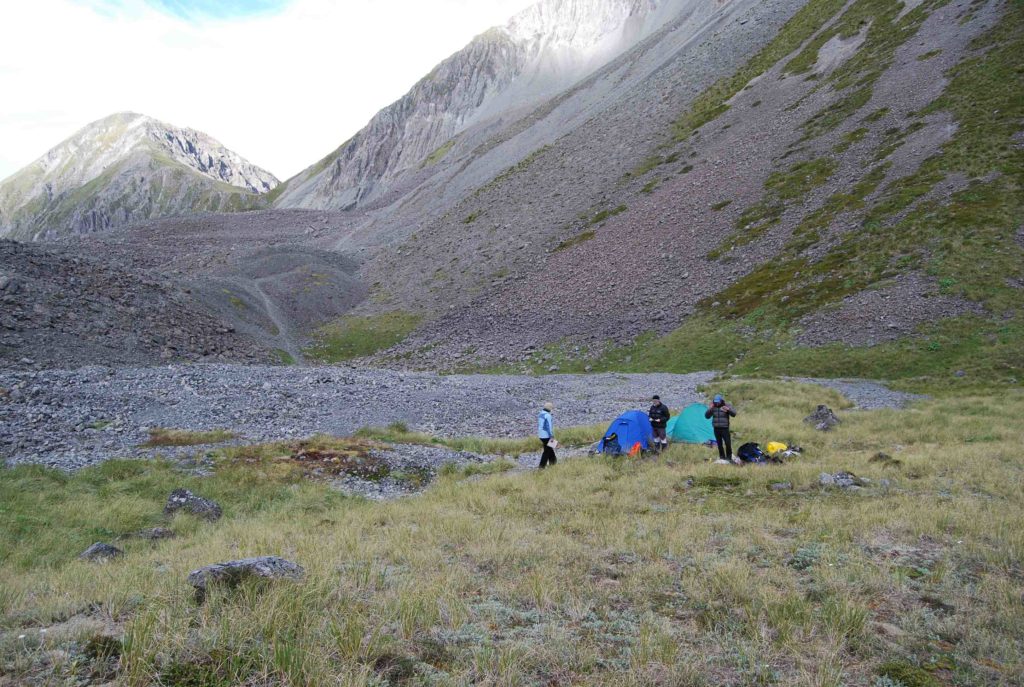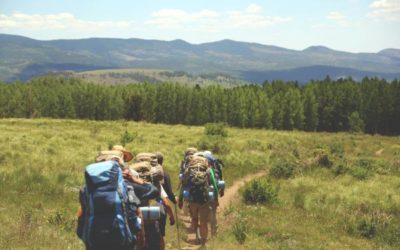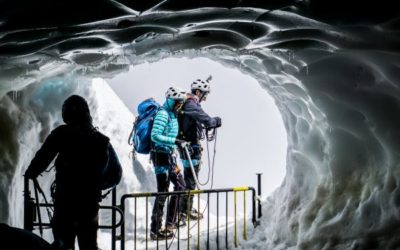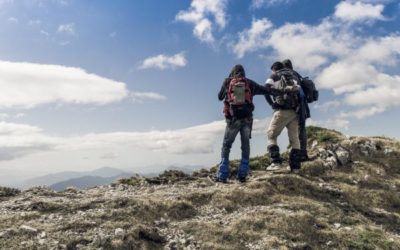There is nothing more scary than a selfish child becoming a selfish adult. If we don’t teach our kids a right attitude toward material possessions, then we may be setting them up for a big fall later in life. As the old adage goes, “The bigger they are the harder they fall.” One of the reasons parents need to be proactive in teaching their kids a good attitude toward possessions is that when you teach and correct someone who is young, even though it might sting, the fall is not very hard. Teaching frugality and limitations to a younger person is incredibly loving because the consequences are less when you are young. But if kids don’t learn humility and frugality while they are young, then when they are older, “the harder they will fall,” when reality hits.
CAMPING COULD HELP REMOVE THE SPLINTER OF SELFISHNESS FROM YOUR HOME
So how is a parent or a student ministry leader supposed to teach a child or teenager a right attitude toward material possessions? Parents see splinters of selfishness in their kids but sometimes wonder, “How do I get this out of our family?” Of course training the heart is a day to day task for parents. We teach biblical wisdom, discipline when needed, and allowing natural consequences. But one very intentional thing you can do to potentially turn your family in a new direction is, Go Camping!
This is not just my humble opinion either. It is biblical wisdom. The Festival of Booths (Hagha-Sukkot) is a Jewish celebration that began centuries ago. It is a week-long camping event designed to help Israel remember their dependence on God as they traveled through the wilderness for forty years. They intentionally live in relatively meager tents to get back in touch with the fact that their identity and happiness had little to do with their possessions:
The rationale for building a sukkah and living in it during the seven days of Hagha-Sukkot (Festival of Booths or Tabernacles) is set forth in Leviticus 23:43: ‘In order that future generations may know that I made the Israelite people to live in sukkot when I brought them out of the land of Egypt.’ The question comes to mind: What is so remarkable or significant about the manner in which the Israelites were housed during their forty-year sojourn in the wilderness that it is necessary to hold a special observance every year, generation after generation, as a reminder?
…The sukkah, it is argued, is a fragile hut and could not have given the Israelites much protection in the wilderness were it not for the presence of God in their midst, the real source of their protection. Hence, the sukkah is a reminder of our complete dependence upon God, since life is so fragile…The Torah is telling us that the entire sojourn of the Israelites in the wilderness was a miraculous one, under the care of the Almighty. And this phenomenon is worth remembering and celebrating with a religious festival. Since we cannot replicate the manna, nor the well-preserved garments of the wilderness, we built the sukkah as a symbol of that miraculous survival. -Josiah Derby [1]
When you take your family camping, you typically live in tents for several days. There are practical and theological reasons for doing this. It helps us remember our dependence on God in everything. It is significant for the Jews that the Festival of Booths is annual and lasts for a week. One would not have the same experience at a Hagha-Sukkot festival if he were sleeping in the comforts of his home at night and just playing games in his tent during the day, would they?
The same is true when your kids enjoy camping in the wilderness with you. There is something special about having extended time in makeshift accommodations that forges trust in God. I say this tongue-in-cheek, but have you ever considered that it is actually a biblical idea to plan an annual weeklong wilderness trip or camping experience with your family or friends? Don’t feel guilty for taking time off to make this happen—it’s biblical!
RELATED: 10 Ways Your Parenting Might Be Crippling Your Kids’ Leadership Potential
THINK ABOUT THE IMPACT OF YOUR OWN CAMPING EXPERIENCES
- In what ways does camping remind you of your need for God?
- How does camping make us more grateful for God’s provision?
- What are some of the lessons we learn while camping that we probably take for granted back in the city?
CAMPING TEACHES US THAT IT IS GOOD TO PACK LIGHT
God wants us to have a right attitude toward possessions. This is because he loves us. He doesn’t want us weighed down by empty pursuit of more possessions. Our lives have a much greater purpose than this. Through wilderness camping experiences, God taught his people to pack light for maximum effectiveness in building his Kingdom. There are many examples of this in the lives of Abraham, Jacob, David, Joshua, etc. We also see Jesus instilling this principle in the disciples as he commissioned them on their first evangelistic journey:
Do not acquire gold, or silver, or copper for your money belts, or a bag for your journey, or even two coats, or sandals, or a staff; for the worker is worthy of his support (Matthew 10:9-10).
A highlight for me in leading wilderness adventures with my own kids or other groups is that I see this people’s attitudes about material possessions becoming more healthy. I see young people discovering this principle of “packing light,” but not in a weird way that causes guilt for having possessions. Rather it shows us how truly happy we can be without going overboard. Camping is a tangible laboratory for learning first hand what Jesus meant when he said:
Watch out! Be on your guard against all kinds of greed; life does not consist in an abundance of possessions. -Luke 12:15
RELATED: Let My People Go Camping! God Wants Us All to Himself | Exodus 5:1-3
CAMPING SHOWS US HOW HAPPY WE CAN BE WHEN WE LIVE IN MODERATION
In my experience whether backpacking, snowshoeing, biking, or paddling it is remarkable how much people enjoy the experience with so few material belongings. In the wilderness, we are more naturally able to comprehend a counter-cultural reality that we need very few material possessions to enjoy a full life. In this context we learn firsthand the age-old proverb: “You can’t strip a naked man.” In the words of Solomon:
Everyone comes naked from their mother’s womb, and as everyone comes, so they depart. They take nothing from their toil that they can carry in their hands (Ecc. 5:15).
To a young person these refining character development experiences are often the beginning of a deeper understanding of what Dietrich Bonhoeffer called the “work” of discipleship. In his description of the twelve disciples he writes:
They are not to go about like beggars and call attention to themselves, nor are they to burden other people like parasites. They are to go forth in the battle-dress of poverty, taking as little with them as a traveler who knows he will get board and lodging with friends at the end of the day. This shall be an expression of their faith, not in men, but in their heavenly Father who sent them and will care for them. It is this that will make their gospel credible. [2]
This is the description of the kind of leaders we need in our world today. Parents, doesn’t this describe what you want for your kids? None of us want spoiled kids, and camping can literally be one of the ways you can avoid setting them up for failure in the future.
LET YOUR KIDS GO CAMPING!
- Plan right now a weekend or several day camping experience with your kids. Winter camping in yurts is great, Spring Break offers opportunities to get out, and the summer will be here before you know it!
- Consider signing up your middle school or high school kids up to go on an expedition or wilderness camping trip with your church or a reputable camp next summer.
- Read these other references to camping in the Bible to inspire you!
- Exodus 16:13; 2 Kings 7:5; Judges 7:11; 1 Samuel 4:6; Judges 7:15; 1 Samuel 28:4; 1 Kings 16:16; Numbers 11:26, 5:3; Deuteronomy 23:14; Exodus 33:7; Leviticus 9:11; Numbers 5:1, 11:30, 3:23, 3:29; Deuteronomy 23:12; Josiah 3:2, Leviticus 17:3; Numbers 11:9; Josiah 10:15,43; Judges 7:10, 20:19; 1 Samuel 17:53; Psalm 106:16
[1] Derby, Josiah, “The Wilderness Experience.” Jewish Bible Quarterly 26, no. 3 (1998): 194. Deuteronomy 8:3-4 recounts the miracle that the Israelite’s clothing did not rot and their feet did not blister.
[2] Bonhoeffer, The Cost of Discipleship, 231.




